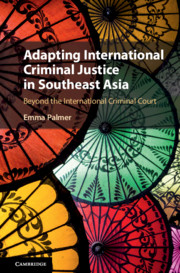Book contents
- Adapting International Criminal Justice in Southeast Asia
- Adapting International Criminal Justice in Southeast Asia
- Copyright page
- Dedication
- Contents
- Tables
- Acknowledgements
- Cases, Laws, and Treaties
- Abbreviations
- 1 Localising International Criminal Justice in Southeast Asia
- 2 Engaging with International Criminal Law alongside an Internationalised Tribunal
- 3 Implementing International Criminal Justice
- 4 Engaging with International Criminal Law as a Non-State Party
- 5 International Criminal Justice in ‘Transition’
- 6 Adapting International Criminal Justice in Southeast Asia
- Book part
- References
- Index
5 - International Criminal Justice in ‘Transition’
Myanmar
Published online by Cambridge University Press: 28 April 2020
- Adapting International Criminal Justice in Southeast Asia
- Adapting International Criminal Justice in Southeast Asia
- Copyright page
- Dedication
- Contents
- Tables
- Acknowledgements
- Cases, Laws, and Treaties
- Abbreviations
- 1 Localising International Criminal Justice in Southeast Asia
- 2 Engaging with International Criminal Law alongside an Internationalised Tribunal
- 3 Implementing International Criminal Justice
- 4 Engaging with International Criminal Law as a Non-State Party
- 5 International Criminal Justice in ‘Transition’
- 6 Adapting International Criminal Justice in Southeast Asia
- Book part
- References
- Index
Summary
After decades of military rule, internal conflict, and international sanctions, under a new government in Myanmar there was emerging opportunity to consider how, if at all, to respond to the serious human rights violations of previous decades, and address ongoing violence that persists today, including in Rakhine (involving the Rohingya), Shan and Kachin States, and in the South East of Myanmar. The relative lack of mechanisms for prosecuting international crimes, and government opposition towards International Criminal Court and United Nations investigations, suggest that Myanmar’s leaders have rejected the norm of international criminal justice. Yet this chapter presents a complex story of ongoing contestation. It first reveals the historical engagement with international criminal law in Myanmar. It then analyses the themes different actors raise when they seek to influence international criminal justice in relation to Myanmar, before analysing Myanmar’s laws and institutions for responding to international crimes. It concludes that while Myanmar represents a highly challenging context for encouraging the prosecution of international crimes, there is a dynamic process of engagement with this norm.
Keywords
- Type
- Chapter
- Information
- Adapting International Criminal Justice in Southeast AsiaBeyond the International Criminal Court, pp. 159 - 206Publisher: Cambridge University PressPrint publication year: 2020



